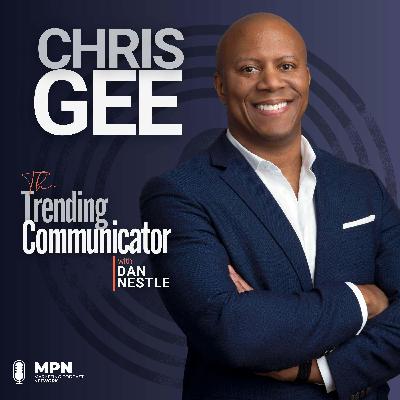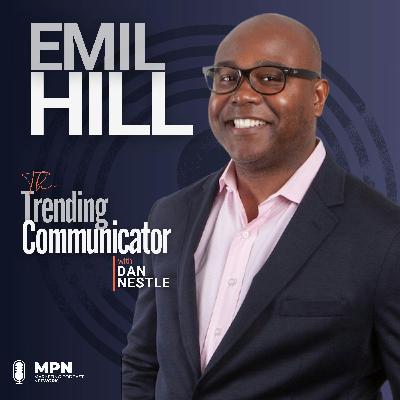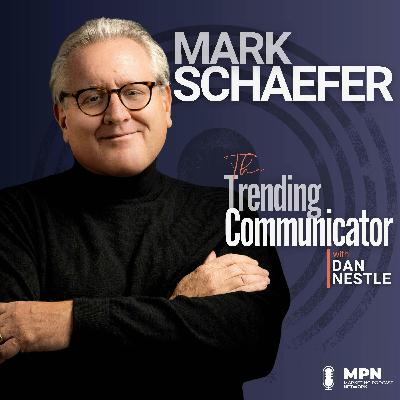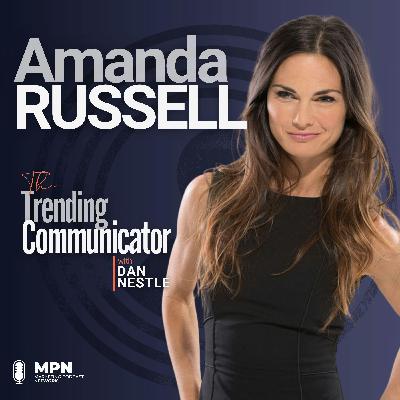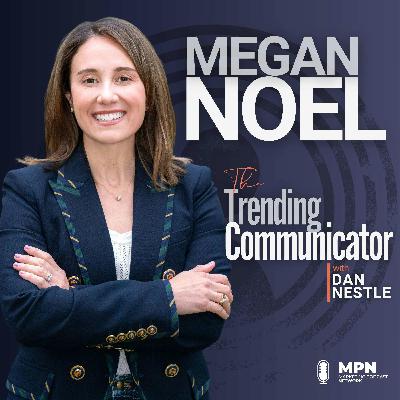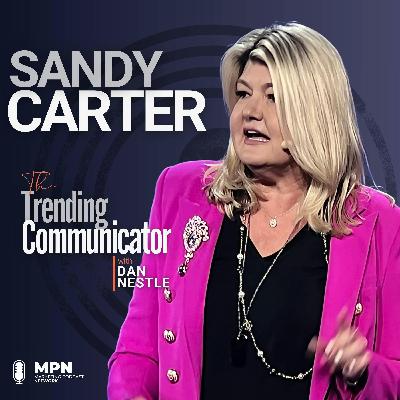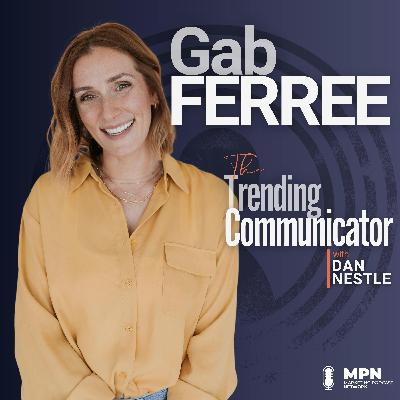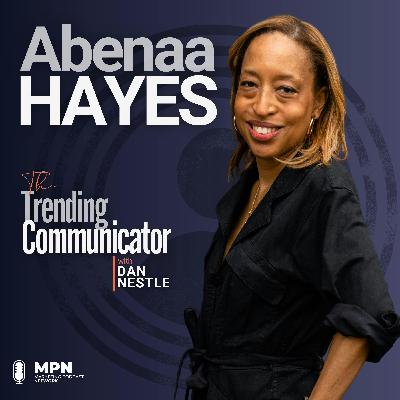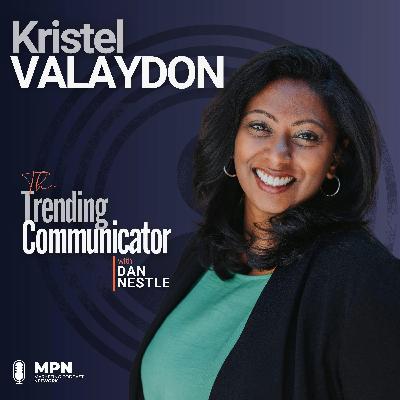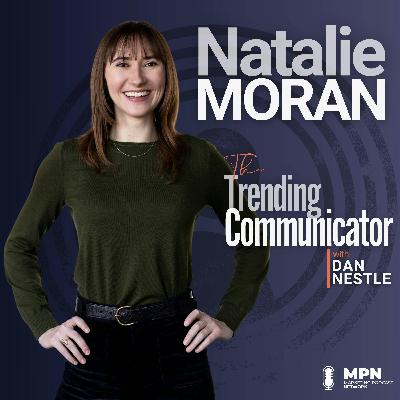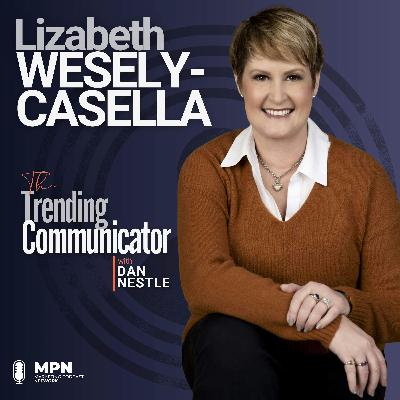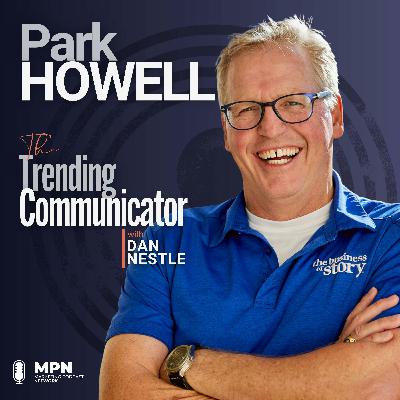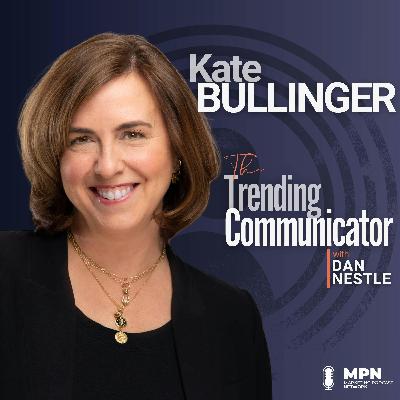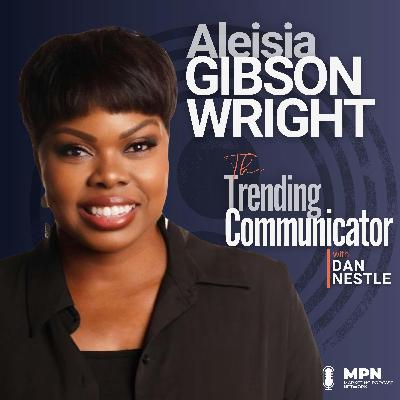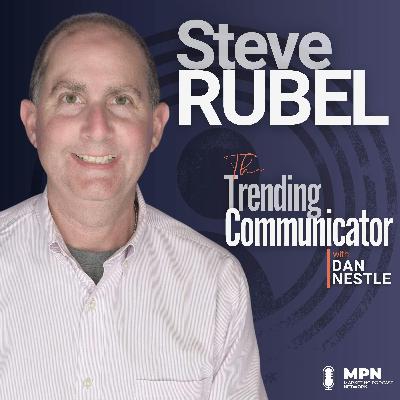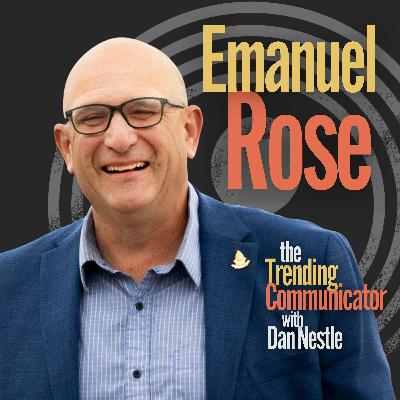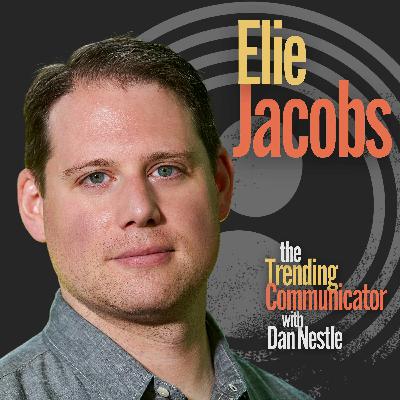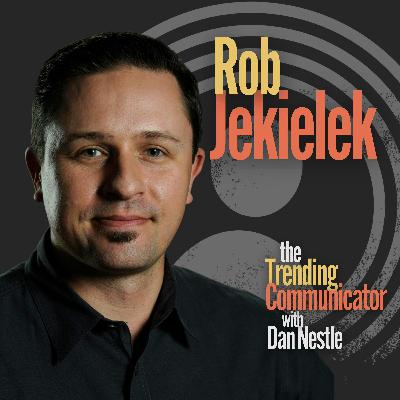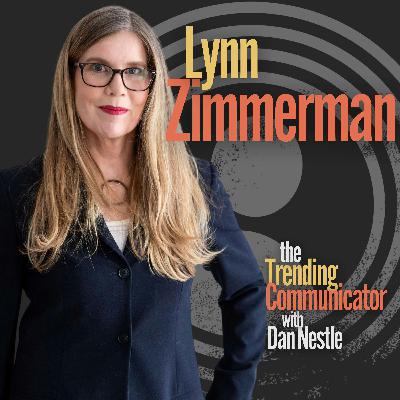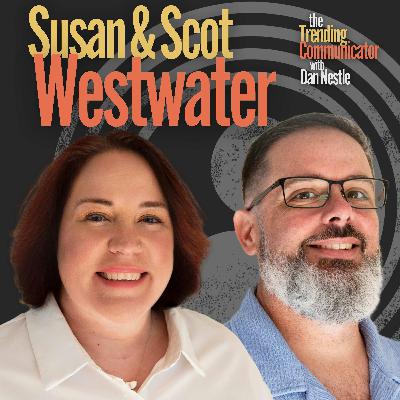Discover The Trending Communicator
The Trending Communicator

 The Trending Communicator
The Trending Communicator
Author: Daniel Nestle
Subscribed: 7Played: 84Subscribe
Share
© Copyright 2025 Daniel Nestle
Description
In today's hyper-accelerated communications world, keeping up means juggling reputation, brand building, crisis management, storytelling, and more while adapting to new technologies like generative AI. The Trending Communicator, hosted by Dan Nestle, is your guide through this chaotic landscape. This podcast dives into the challenges of PR, communications, and marketing today, with experts sharing real stories and strategies for overcoming those challenges and more. It's the perfect resource for professionals looking to innovate, take risks, and stay ahead. Join us to make sense of today’s communications chaos, one insightful conversation at a time.
115 Episodes
Reverse
Companies keep approaching AI the way they approached every other tech rollout: install it, train on it, expect immediate returns. But AI isn't software. It's imperfect by design, doesn't follow a predictable implementation curve, and the gap between what leadership promised the board and what's actually happening is becoming a serious problem.
In this episode of The Trending Communicator, host Dan Nestle sits down with Chris Gee, founder of Chris Gee Consulting and strategic advisor to Ragan's Center for AI Strategy. Chris has survived four career reinventions driven by technological disruption—from watching his graphic design degree become obsolete the day he graduated to now helping organizations navigate the shift to agentic AI. His motto, "copilot, not autopilot," frames the entire conversation.
Chris and Dan dig into why AI adoption is stalling—because companies are treating transformation like a switch to flip rather than a capability to build. They explore the parallel to 1993's Internet boom and why the adoption curve is right on schedule despite executive frustration. The conversation gets practical: Chris shares how he built an AI agent named "Alexa Irving" for client onboarding, and they tackle whether doom-and-gloom predictions from AI CEOs are helping or hurting the people who actually need to use these tools.
Listen in and hear about...
Why the adoption curve for AI mirrors the early Internet
The $17 trillion argument against AI replacing all jobs (hint: someone has to buy things)
How prompting skills aren't going away
Building agentic AI with guardrails: Chris's "Alexa Irving" experiment
Why "copilot, not autopilot" is more than a slogan—it's a survival strategy
The skills gap nobody's addressing and why we need more brains who understand AI, not fewer
Notable Quotes
"My motto is copilot, not autopilot. I wholeheartedly believe that we are going to make the most progress using AI in tandem—where humans focus on the things that we do well and we use AI for the things it does better than we do." — Chris Gee [04:19]
"17 is $17 trillion—that's what the American consumer spends per year. 70 is the percentage of US GDP that represents. And zero is the amount of money that AI chatbots, LLMs, and agents have to spend." — Chris Gee [23:57]
"Your ability was never simply in your ability to string together words and phrases, but to translate experiences or emotions and create connection with other humans." — Chris Gee [36:44]
"It's not thinking and it never will be thinking. So if we understand that, then we understand it won't be thinking like a human." — Chris Gee [1:07:00]
Resources and Links
Dan Nestle
Inquisitive Communications | Website
The Trending Communicator | Website
Communications Trends from Trending Communicators | Dan Nestle's Substack
Dan Nestle | LinkedIn
Chris Gee
Chris Gee Consulting | chrisgee.me
Chris Gee | LinkedIn
The Intelligent Communicator Newsletter | chrisgee.me (sign up on website)
Timestamps
0:00:00 AI Transformation: Hype vs. Reality in Communications0:06:00 Human Touch vs. Automation in Service Jobs0:12:40 Early Career Transformation & Adapting to Technology0:18:00 AI Adoption Curve: Early Adopters and Laggards0:23:30 Tech Disruption, Job Fears, and Economic Impact0:29:10 Prompting and Obstacles to AI Adoption0:34:45 Redefining Skill Sets & Human Value with AI0:40:45 Efficiency, Productivity, and Creativity with AI Tools0:46:20 Rethinking Work: Flexible Schedules & Four-Day Weeks0:51:39 Practical AI Use Cases: Experiment and Upgrade0:55:11 Agentic AI: Autonomous Agents and Guardrails1:01:29 Autonomous Agents: Oversight, Guardrails, and Risks1:08:15 AI Is Imperfect: Why Human Judgment Remains Essential1:14:16 AI Quirks, Prompting Challenges, and Adoption Friction1:19:41 Wrap-Up: Finding Chris Gee & Newsletter/Prompt Suggestions1:21:18 Final Thoughts & Episode Closing
(Notes co-created by Human Dan, Claude, and Castmagic)
Learn more about your ad choices. Visit megaphone.fm/adchoices
You can't communicate your way out of a values problem. Yet every day, communications leaders are expected to do precisely that.
In this episode of The Trending Communicator, host Dan Nestle sits down with Emil Hill, principal of The Creshiem Group and a public affairs strategist with 25+ years navigating the intersection of business, government, and communications. From guiding the W.K. Kellogg Foundation through Truth, Racial Healing and Transformation to helping Papa John's face their reckoning, from UnitedHealth Group to the National Education Association, Emil's been the strategist organizations call when quick fixes won't cut it.
Emil and Dan explore why the consolidation of corporate communications, investor relations, government relations, and research under corporate affairs* umbrellas is the recognition that every stakeholder now connects to every other stakeholder. They dig into why crises reveal values misalignment, why your stock price timeline and your actual problem timeline are incompatible, and why "calm, clarity, and precision" matters more when everything's moving faster.
*Dan says “Public Affairs” but means “Corporate Affairs” throughout the episode. He apologizes, especially to Megan Noel, for his confusion.
Listen in and hear about...
Why corporate affairs consolidation signals a fundamental shift in stakeholder connectivity
How a finance background changes how you diagnose communications problems
The gap between executive timelines and the time real organizational change requires
Why quick crisis fixes usually miss what's actually broken
Navigating uncertainty with optimism when change is inevitable
Notable Quotes
On The Power of Immersive Partnership: "I don't know if you can really be a good partner to any client if you don't immerse yourself in their business, understand who their competitors are, try to get a sense for their DNA and try to advise based on those understandings. If you don't have that, yeah, you're going to fall short every time." — Emil Hill [00:07:53 → 00:08:17]
On The Future of Local News: "I am craving a deeper dive into, into local news that the Washington Post cannot provide for me and Mary about what's going on here that's not in the news. And it feels like with the evolution of technology, some enterprising business person is going to figure out a way to cobble together more information and news about particular parts of the country, city, state and local in a way that we used to." — Emil Hill [01:00:27 → 01:01:03]
On Navigating Economic Uncertainty: "I think businesses, individuals and communities around the country, I think you want to hold on to your optimism. I think you should get active, but ride it. And this too shall pass." — Emil Hill [01:06:59 → 01:08:08]
Resources and Links
Dan Nestle
Inquisitive Communications | Website
The Trending Communicator | Website
Communications Trends from Trending Communicators | Dan Nestle's Substack
Dan Nestle | LinkedIn
Emil Hill
Emil Hill | LinkedIn
Timestamps
0:00:00 Introduction – Rise of Public Affairs and Emil Hill’s Expertise0:06:15 Pathways into Public Affairs – Problem Solving and Business Acumen0:11:03 Consolidation of Corporate Communications Functions0:16:44 Stakeholder Connections in a Rapid News Cycle0:23:19 Measuring Audience Sentiment and Internal vs. External Messaging0:29:22 Persuading Stakeholders – Importance of Data and Explanation0:34:57 AI’s Role in Communications – Data, Analysis, and Domain Expertise0:42:32 Brand Missteps and the Limits of Research0:47:13 Real Audience Research vs. Social Media Noise0:53:42 New Corporate Affairs Capabilities – Local Sentiment and Crisis Response0:58:44 Local News Evolution and Technology’s Impact1:04:39 Ideas for AI-Driven Local News Coverage1:08:08 Optimism, Change, and Closing Thoughts1:09:36 Outro and Subscription Info
(Notes co-created by Human Dan, Claude, and Castmagic)
Learn more about your ad choices. Visit megaphone.fm/adchoices
Your customers are changing because of AI. But so are you—whether you realize it or not.
Host Dan Nestle welcomes back Mark Schaefer, whose new book How AI Changes Your Customers reveals a transformation most people aren't prepared for. As one of 300 futurists who contributed to Elon University's Being Human in 2035 study, Mark brings insights beyond the usual AI hype.
Mark and Dan explore the psychological rewiring that is happening as AI reshapes human agency, empathy, purpose, and trust. They confront the choice everyone faces: use AI to augment your thinking, or delegate so much that critical skills atrophy.
This isn't another "AI will save us" or "AI will ruin everything" conversation. It's a balanced look at implications most people haven't considered—like algorithms becoming decision-makers, with conversion rates from AI referrals 23 times higher than those from traditional SEO.
Listen in and hear about...
The psychology of AI and how humanity is being rewired
Choosing between augmentation and delegation in your AI usage
Why algorithms are becoming your actual customers
The loss of agency, empathy, and purpose when we depend too heavily on AI
How AI reveals patterns you didn't know existed through intellectual archaeology
Notable Quotes
On The Psychology of AI: "No one's talking about the psychology of AI that literally before our eyes, humanity is being rewired. The psychology of human beings is changing." - Mark Schaefer [00:08:13 → 00:08:28]
On Attention Spans: "Don't tell me people don't have a long attention span. The problem is they're being more selective. You've got to earn it. So it's not that they have a short attention span. You, You've got a short interesting span. They're abandoning you for something else." - Mark Schaefer [00:15:38 → 00:15:53]
On The Power of Vulnerability: "What this world is lacking is a real human voice, friendly, accessible, vulnerable. And think about the power of that. To really be human. You've got to be. Have a sense of vulnerability. But we don't get that from brand voices. Very, very rarely. And think of the opportunity to stand out, to be audacious, to just by flubbing up once in a while, just by admitting you made a mistake every once in a while." - Mark Schaefer [00:27:37 → 00:28:05]
Resources and Links
Dan Nestle
Inquisitive Communications | Website
The Trending Communicator | Website
Communications Trends from Trending Communicators | Dan Nestle's Substack
Dan Nestle | LinkedIn
Mark Schaefer
Mark Schaefer | Website and Blog
How AI Changes Your Customers | Book (Amazon)
The Marketing Companion | Podcast
Mark Schaefer | LinkedIn
The RISE Community | Apply to Join
Timestamps
0:00:00 AI’s Impact: Dan’s Intro and Use of NotebookLM0:03:03 Mark’s Reaction: AI Enables Bolder, Creative Work0:05:16 Mutual Mentorship and AI Experimentation0:07:29 Mark’s Book: Humanity’s Changing Psychology with AI0:09:12 Agency, Empathy, Intimacy, and AI Decision-Making0:11:41 AI Search: GEO, Marketing to Algorithms0:13:02 The Golden Age of PR: Credibility and Authority0:15:13 Attention Span Myth & Content Selectivity0:17:21 Volume vs. Quality: Content for AI and Humans0:19:35 Cumulative Advantage & Brand Authority in AI Era0:21:42 Personal Brand Building: Quality is Essential0:23:13 Earning Social Signals & Genuine Content0:25:47 AI Editing, Strategic Awkwardness, and Vulnerability0:28:46 Challenges for Corporates: Embracing Awkwardness0:31:20 Feelings as a Competitive Advantage0:35:28 Transcendence: Artful, Long-Form, and Human Content0:37:56 Respecting the Reader: Content Length & Value0:39:55 Hopeful AI: Augmentation, Mentorship, Markbot0:42:24 Real Education & AI: Preparing Young People0:42:46 Closing Remarks: Book Recommendation & Mark’s Links
(Notes co-created by Human Dan, Claude, and Castmagic)
Learn more about your ad choices. Visit megaphone.fm/adchoices
You can be the smartest person in the room, but if no one knows you or your point of view, you don't have authority. This "authority gap" is why most professionals struggle to earn attention, build trust, and gain influence.
In this episode, host Dan Nestle sits down with Amanda Russell, author of The Influencer Code, creator of the influence equation (Influence = Attention + Trust), founder of Amanda's Playbook, and architect of UCLA's first fully accredited influencer marketing program. Amanda challenges the assumption that awareness equals influence, revealing why measuring clicks and impressions keeps communicators trapped in vanity metrics rather than building real relationship capital.
For Amanda this isn't just a theory - she knows from experience. From Olympic hopeful to eager consultant to fitness influencer to CMO to educator, she evolved a systems-thinking approach to influence that PR and communications professionals desperately need. She and Dan explore why earned attention compounds while bought attention doesn't, how AI is democratizing content but making authentic relationships more valuable, and why success requires running purposeful miles instead of junk miles.
Listen in and hear about:
Why the influence equation (attention + trust) matters more than awareness metrics
The critical difference between authority and expertise—and why it changes everything
How to build "relationship capital" instead of chasing vanity metrics
What elite distance running teaches about strategic influence building
Why AI makes human relationships your ultimate competitive advantage
Notable Quotes
On Influence vs. Awareness: "You can have all the eyeballs all day long. You can have all the awareness, but if nobody cares or you're not influencing anybody to do anything, that's not influence." - Amanda Russell [06:57]
On Authority: "Authority is when people quote you in rooms you've never even been in." - Amanda Russell [22:40]
On Earned vs. Bought Attention: "Trust is not scalable, but it's transferable. When someone vouches for you, they're transferring their influence to you." - Amanda Russell [20:24]
On Building Real Influence: "Real relationships take time to develop and they take nurturing and they take work. It's about building the foundation of a house versus just slapping up a tent." - Amanda Russell [33:20]
On AI and Expertise: "AI doesn't make you an expert, but if you're already an expert, it makes you unstoppable if you know what to do." - Amanda Russell [43:30]
Resources and Links
Dan Nestle
Inquisitive Communications | Website
The Trending Communicator | Website
Communications Trends from Trending Communicators | Dan Nestle's Substack
Dan Nestle | LinkedIn
Amanda Russell
Amanda Russell | Website
The Influencer Code | Book
Amanda's Playbook | YouTube
Amanda Russell | LinkedIn
Timestamps
0:00 Intro: Influence equals attention plus trust
5:23 Defining influence beyond social media stereotypes
10:25 Moving past vanity metrics in PR/marketing
15:54 Three steps to build systematic influence
20:24 Authority vs expertise in building influence
25:28 Focusing on audience needs and relationships
30:52 Relationship architecture trumps marketing tactics
37:49 AI's impact on content creation and influence
41:38 Using AI to amplify expertise, not replace it
45:24 New model for business education and influence
(Notes co-created by Human Dan, Claude, and Flowsend.ai )
Learn more about your ad choices. Visit megaphone.fm/adchoices
What happens when the communications function stops being about messaging and starts being about business transformation? When your stakeholders include 10,000 employees, 94,000 students, 350,000 alumni, plus investors, policymakers, and healthcare partners?
In this episode of The Trending Communicator, host Dan Nestle reconnects with Megan Noel, Chief Corporate Affairs Officer at Adtalem Global Education, to explore why the CCAO role is a fundamental reimagining of what communications does. Megan leads government relations, investor relations, public affairs, impact and sustainability, and alumni relations under one reputation-focused banner.
From managing the fallout of the "One Big Beautiful Bill" over July 4th weekend to navigating AI search optimization and Wikipedia's importance in reputation management, Megan and Dan dig into the practical realities of corporate affairs at scale. They explore how business acumen has become a hard skill, why curiosity beats credentials, and how communicators can avoid becoming "negative Nancy" while still providing strategic counsel.
Listen in and hear about...
Why corporate affairs unifies storytelling across all stakeholder groups under a reputation banner
How business acumen requires being "dangerous enough" in finance, law, and HR without becoming an expert
The surprising importance of Wikipedia and specific media outlets in AI search and GEO optimization
Why saying "yes, how" beats saying "no, but" when working with business leaders
How curiosity and innovation mindset separate entry-level candidates who get jobs from those who don't
The challenge of maintaining unbiased reputation when AI search platforms pull from potentially compromised sources
Notable Quotes
On Corporate Affairs Evolution: "The corporate affairs model is just the next step in that evolution. We used to just communicate what the business wanted. Now we're more than just a channel strategy to push things to different audiences." - Megan Noel [07:30]
On Business Acumen: "I certainly don't need to be as sophisticated in our numbers as our CFO. But I need to be dangerous enough in all of them to be able to sit down at a very senior level and have a thoughtful conversation." - Megan Noel [20:29]
On Strategic Counsel: "Instead of saying no, but—offer alternatives or other options so that we could potentially get to yes. When you do have to say the no, it feels like you're using that really thoughtfully and people will take you seriously." - Megan Noel [23:39]
On AI Search Reality: "There is a perception that whatever question you ask AI is unbiased, when in fact it's pulling information through just a different algorithm. It could be just as biased with other bad data." - Megan Noel [46:56]
On Innovation Mindset: "The hiring manager said it was because she showed an appetite to push and to learn and to innovate. That skill, even at the very entry level, matters." - Megan Noel [59:35]
Resources and Links
Dan Nestle
Inquisitive Communications | Website
The Trending Communicator | Website
Communications Trends from Trending Communicators | Dan Nestle's Substack
Dan Nestle | LinkedIn
Megan Noel
Adtalem Global Education | Website
Megan Noel | LinkedIn
Timestamps
0:00 Intro: Change in PR and marketing
5:47 Evolution of Chief Corporate Affairs Officer role
13:06 Reputation as unifying banner for corporate affairs
19:40 Importance of business acumen for leaders
24:39 Communications as a critical business skill
27:46 Relationship between corporate affairs and marketing
31:28 Fostering disagreement and diverse perspectives
35:41 Impact of AI on search and reputation management
41:24 Proactively managing reputation in AI era
49:28 Balancing content creation and stakeholder engagement
53:43 Innovation as key leadership trait
57:41 Cultivating curiosity and innovation across teams
1:03:31 Closing remarks and contact information
(Notes co-created by Human Dan, Claude, and Flowsend.ai )
Learn more about your ad choices. Visit megaphone.fm/adchoices
MIT just dropped a bomb: 95% of corporate AI initiatives are failing. Not struggling. Failing. And Sandy Carter knows exactly why.
In this episode of The Trending Communicator, I sit down with Sandy, currently Chief Business Officer at Unstoppable Domains, former VP at Amazon Web Services, and the person who turned IBM's "social business" concept nobody understood into a $200 billion market. Sandy's written seven books, been named to every power list that matters (CNN's Top 10 Most Powerful Women in Tech, Forbes 50 Over 50), but what caught my attention is her philosophy: "AI First, Human Always."
While everyone's either selling AI snake oil or running scared, Sandy's figured out something crucial. Companies aren't failing at AI because the technology doesn't work. They're failing because they're treating it like any other IT rollout: layer it on top of broken processes and hope for magic. Sandy shares why CEOs need to stop brainstorming and start "playstorming," what happens when you ignore Reddit for three years, and why your daughter talking to Grok about party outfits might be the most important trend in communications.
Listen in and hear about:
The real reason 95% of corporate AI fails (hint: it's not the technology)
Moving beyond productivity theater to genuine transformation
Why GEO (Generative Engine Optimization) changes everything for communicators
The "play storm" revolution and why your CEO needs to get their hands dirty
How ignoring Reddit and Wikipedia is killing your AI presence
The generational divide in AI adoption and what it means for business
Notable Quotes
"Audiences today are ready to move on from 'how do I use gen AI for productivity?' into something deeper: What does it mean for us as humans?" - Sandy Carter [00:05:14]
"If your process already didn't work, there's no magic in AI that's going to make it wake up and work." - Sandy Carter [00:18:42]
"You have to experience it. You have to get your hands into it. You have to play with an agent." - Sandy Carter [00:27:38]
"If you take one thing from this whole podcast, put your company in [AI search], put yourself in too, and see what comes out." - Sandy Carter [00:50:54]
Resources and Links
Dan Nestle
Inquisitive Communications | Website
The Trending Communicator | Website
Communications Trends from Trending Communicators | Dan Nestle's Substack
Dan Nestle | LinkedIn
Sandy Carter
sandycarter.net | Website
Unstoppable Domains | Website
Sandy Carter | LinkedIn
Sandy's Book: AI First, Human Always
Timestamps
0:00 Intro: Host welcomes Sandy Carter
5:23 AI's impact on human meaning and work
10:24 Why 95% of corporate AI projects fail
15:23 Redesigning workflows for AI integration
20:44 Generational differences in AI adoption
26:58 The importance of "play storming" with AI
32:13 Training everyone on AI, not just tech teams
37:05 Voice interfaces and generational preferences
41:32 Generative Engine Optimization (GEO) strategies
48:43 Checking your company's AI presence
54:41 Closing thoughts on AI and communications
(Notes co-created by Human Dan, Claude, and Flowsend.ai )
Learn more about your ad choices. Visit megaphone.fm/adchoices
Gab Ferree led global communications at Slack, Bumble, and OneTrust, reaching every traditional summit in our profession. Then she walked away to build Off The Record, where communications professionals can finally admit they don't have all the answers. Even the VPs who are supposed to.
In this conversation, we explore why 100% of comms professionals are using AI but nobody's talking about it, why reporting to a CMO might be better than reporting to the CEO, and how to stop asking for a seat at the table and start earning it through business outcomes.
What We Get Into
Redefining Success in Communications: Why Gab left high-profile roles to create a support system for other professionals
The Marketing-Communications Relationship: How reporting to a CMO can actually benefit communications teams
AI as a Career Amplifier: Why AI won't replace communicators, but will make them more valuable
The Future of Work Post-AI: Examining productivity gains and their implications for work-life balance
Building a Supportive Community: How Off the Record is changing the game for communications professionals seeking growth and connection
Notable Quotes
"I don't care what my title is and I don't care what my reporting line is. I am the Chief Communications Officer. When I am the head of comms and I do have a seat at the table, I don't have to be reporting into the CEO." - Gab Ferree [10:08 → 10:22]
"But guess what? Everyone just got promoted. Everyone just got themselves a new specialist underneath them named Claude, who produces everything for you as a first draft. And it may be good, it may be great. Good job. You prompted the model, right? You've trained it right?" - Gab Ferree [40:47 → 41:04]
"I do wonder for like outside of that, are people are going to start talking about like our executives going to talk about like that they have more time, that they get to spend more time with their kids. Maybe they're not burning out. Maybe they don't need to step away to spend more time with their family. Maybe our careers can be more like a marathon and less like a sprint." - Gab Ferree [52:29 → 52:57]
About the Guest
Gab Ferree is the founder of Off The Record, a private membership community for communications professionals. Previously, she served as VP of Global Communications at OneTrust (scaling from startup to $5.1B valuation), led comms at Bumble through major brand transformation, and guided Slack's communications during its Salesforce integration. She's known for her pragmatic approach to building comms programs that align with business goals and her belief that vulnerability and authority can coexist in leadership.
Resources Mentioned
Salesforce V2MOM framework for goal alignment
Future Forum research on the future of work
Axios HQ survey on AI usage in communications
Connect with Gab Ferree
Gab Ferree| LinkedIn
Off The Record | Website
Connect with Dan Nestle
Inquisitive Communications | Website
The Trending Communicator | Website
Communications Trends from Trending Communicators | Dan Nestle's Substack
Dan Nestle | LinkedIn
Timestamps
0:00 Intro: Meet Gab Faree, comms expert
5:20 Aligning communications to business goals
11:35 The value of comms reporting to CMO
18:29 Demonstrating value as a communicator
24:20 Using AI to boost productivity in comms
30:52 The future of work and flexible arrangements
37:21 AI as a tool for innovation in companies
44:07 Survey reveals widespread AI use in comms
50:27 Rethinking work hours in the AI era
59:41 Preview of upcoming AI training for comms
1:05:25 Comms poised to own generative AI optimization
(Notes co-created by Human Dan, Claude, and Flowsend.ai )
Learn more about your ad choices. Visit megaphone.fm/adchoices
Can you juggle? If you're a communications pro today, you'd better learn how. Just when you think you've got a good rhythm going, someone tosses you another responsibility. Maybe it's a new social platform. Maybe it's a cultural shift that changes how your audience thinks. Maybe it's AI lighting everything on fire. But you can handle it.
In this episode of The Trending Communicator, host Dan Nestle sits down with Abenaa (Abby) Hayes, founder and CEO of Elysee Consulting, who's been perfecting this professional juggling act for over two decades, helping executives and organizations navigate inclusion and social impact communications without losing their footing. She doesn't just help companies say the right things; she helps them figure out how to authentically live their values in a fractured landscape where performative statements can and do backfire often.
What happens when the inclusion specialist walks out of the room? Ask American Eagle about their Sydney Sweeney campaign. Or better yet, listen as Abby breaks down why having the right people in the room matters more than ever, and why those people shouldn't be treated like cops, but as strategic advisors who help you achieve what you actually want to achieve. This conversation goes way beyond the DEI acronym to explore what it really means to show up authentically when everyone's watching, everyone's got an opinion, and the stakes keep getting higher.
Listen in and hear about...
Why "showing up" means more than just posting something and walking away
How the fractured media landscape requires meeting audiences where they actually are (hint: it's not always the New York Times)
The real reason former journalists are becoming PR's secret weapon
Why AI literacy isn't optional anymore—the people who know AI are coming for your job
How to navigate inclusion without becoming the content police
The American Eagle case study and what happens when brainstorms escape into the wild
Why curiosity might be your only real competitive advantage
Notable Quotes
On the Importance of Inclusion: "To me that's ultimately what it's about. And if I just look at the demographics, both of the US and globally, like we're truly operating in a multicultural and multiethnic world." - Abenaa Hayes [11:40 → 12:02]
On the Evolution of Media Relations: "Media relations is no longer the be all end all in terms of not only driving awareness but cultivating credibility. Right. You've got to take literally like a multi step approach in order to drive ultimately what I call brand engagement." - Abenaa Hayes [36:20 → 37:15]
On AI Literacy: "If you're really looking to future proof a career, your competency and know how to navigate everything that's coming, you have to actually understand how to use it and also be fluent in it." - Abenaa Hayes [50:03 → 51:50]
On AI in Communication: "My contention is that none of this is going to take your job because your job itself is going to be so much different that if you lose your job, it's kind of on you." - Dan Nestle [56:41 → 57:41]
Resources and Links
Dan Nestle
Inquisitive Communications | Website
The Trending Communicator | Website
Communications Trends from Trending Communicators | Dan Nestle's Substack
Dan Nestle | LinkedIn
Abenaa (Abby) Hayes
Elysee Consulting | Website
Abenaa Hayes | LinkedIn
Timestamps
0:00 Intro: Juggling priorities as communicators
5:30 Abena Hayes: Navigating inclusion and social impact
11:39 The importance of authentic inclusion efforts
18:02 Media relations in a fractured landscape
25:01 Storytelling's role in effective communication
31:38 AI literacy and its impact on careers
38:15 The future of communications jobs
44:26 Generative AI and earned media strategies
50:02 Critical thinking in the age of AI
54:39 AI as a tool, not a replacement
1:00:36 The evolving role of communications professionals
1:06:32 Curiosity as a key skill for communicators
(Notes co-created by Human Dan, Claude, and Flowsend.ai )
Learn more about your ad choices. Visit megaphone.fm/adchoices
How many of us are stuck playing media relations hits-and-misses while the real opportunities to drive business transformation seem to be just out of reach?
In this episode of The Trending Communicator, host Dan Nestle sits down with Kristel Valaydon, founder of KV Communications, to explore her revolutionary Five Spheres of Connection framework and our capacity to transform PR into a leadership strategy. After 25 years in the industry and 15 years developing her approach, Kristel challenges the traditional view that PR is a marketing function. Instead, she positions communications as a business strategy that creates community around ambitious founders and forward-thinking teams.
Their conversation digs into why most communications work is just broadcasting, how the fractured media landscape demands new approaches, and why AVEs (advertising value equivalents) need to disappear forever. Kristel shares insights from working with what she affectionately calls "rebels and misfits" – innovative leaders trying to shift minds, models, and markets while building genuine communities around their missions.
What We Talk About:
The Five Spheres of Connection: Visionaries, Trailblazers, Champions, Discoverers, and Pathfinders
Why PR as media relations is only one-fifth of what communications professionals should be doing
How community building differs from audience development and why it matters
The evolution of media companies and the rise of niche, trade, and newsletter platforms
Why founders and rebels need different communication strategies than Fortune 500 companies
The role of AI as a research and strategy partner while maintaining human-first approaches
Moving beyond AVEs and impressions to business-aligned measurement frameworks
Notable Quotes
On the Evolution of PR: "I came out into the real world of business and an agency and I just noticed for pretty much the duration it was media relations. It was very much focused on celebrity." - Kristel Valaydon [6:50 → 7:05]
On Measuring PR Impact: "We're having those business conversations and discovering actually no one's measuring this. How are we measuring this? And as it turns out, what benefits are we giving the clients here?" - Kristel Valaydon [7:35 → 7:50]
On Working with Rebels: "We call them rebels and misfits, but it's a term of endearment. They don't call themselves that at all, but they're so creative and innovative and they are trying something completely different." - Kristel Valaydon [9:10 → 9:25]
On the Role of AI in Strategy: "I love AI from a strategic point of view. It's a strategic, you know, sort of sparring partner for me. It's really testing my ideas and really going, how can we make this better?" - Kristel Valaydon [59:00 → 59:10]
On Challenging Clients: "We're in services. We're not in servitude, and we are the experts." - Kristel Valaydon [1:06:13 → 1:06:14]
Resources and Links
Dan Nestle
Inquisitive Communications | WebsiteThe Trending Communicator | WebsiteCommunications Trends from Trending Communicators | Dan Nestle's SubstackDan Nestle | LinkedIn
Kristel Valaydon
KV Communications | Website5 Spheres of Connection | KV Comms WebsiteKristel Valaydon | LinkedIn
Timestamps
0:00 Intro: The future of communications
5:43 Kristel's journey from agency to entrepreneurship
11:29 Working with rebels and misfits as clients
18:51 How media companies are adapting to change
25:12 The five spheres of connection framework
34:28 Discoverers: Customers and early adopters
41:00 Pathfinders: External partnerships and media
46:43 Measuring success across the five spheres
53:05 Starting with an audit and prioritization
58:11 AI as an enabler for the five spheres
1:04:37 PR's role in building a better world
(Notes co-created by Human Dan, Claude, and Flowsend.ai )
Learn more about your ad choices. Visit megaphone.fm/adchoices
We can navigate a crisis, position a CEO, and craft messaging for millions of people. So why do so many brilliant communications professionals struggle when it comes to talking about themselves?
In this episode of The Trending Communicator, Dan sits down with Natalie Moran, founder of Comms Futurist, who's built her practice around this exact challenge. After managing crisis communications for millions and working at the highest levels of government, Natalie noticed a paradox: the same people who excel at strategic positioning for others often can't articulate their own evolving value.
It's the classic cobbler's children scenario . We've been trained not to be the story, especially those of us with journalism backgrounds. Natalie calls it what it is - we're simply unpracticed at talking about ourselves.
But when two AI-obsessed communicators get together to mull this problem, we (shockingly) discover that even cobblers can benefit from AI.
What We Talk About
Why AI might actually help us do more of the work we love instead of replacing us entirely
The personal branding problem that's plagued our profession forever - and how AI changes the equation
Those uncomfortable moments when people ask if we're "AI experts" (spoiler: we're not, we're just curious)
The shift from traditional media relations to working with micro-influencers and content creators
How Natalie went from avoiding LinkedIn entirely to building a following by learning out loud
Practical ways to start experimenting with AI tools without feeling like you're cheating or losing your authentic voice
Notable Quotes
On the Evolution of Personal Brand: "I quickly realized that there is a real market for coaching comms professionals on how to talk about themselves and how to promote themselves. Because by the time people realize they need to do it, it's too late." - Natalie Moran [41:32 → 41:50]
On the Challenges of Self-Promotion: "These are smart people, they're totally capable, but they just are not practiced at exploring kind of what makes them unique and what differentiates them until like the night before a big interview for a job or something." - Natalie Moran [47:04 → 47:26]
On the Importance of Online Presence: "I think being visible online and having an online presence is the new first impression times 100. You have to have an online presence and it's career insurance." - Natalie Moran [1:06:31 → 1:06:45]
On the Role of Micro-Influencers: "B2B companies especially are looking to people like us who have, you know, moderately sized followings but very hyper specific audiences to promote products and services, period." - Natalie Moran [1:07:30 → 1:07:45]
On the Value of Storytelling: "I think the premium on being a good storyteller is higher now than it's ever been. That is a very, very valuable skill, I think, in the world of AI." - Natalie Moran [53:32 → 53:45]
Resources and Links
Dan Nestle
Inquisitive Communications | Website
The Trending Communicator | Website
Communications Trends from Trending Communicators | Dan Nestle's Substack
Dan Nestle | LinkedIn
Natalie Moran
Comms Futurist | Website
Natalie’s Prompt Pack for Comms Leaders | Notion
Natalie Moran | LinkedIn
Timestamps
0:00 Intro: Trust recession and evolving communications
5:23 AI's impact on personal branding in comms
11:44 Ethical considerations in AI-assisted communication
17:25 Overcoming resistance to personal branding
23:15 AI as a tool for human-centric communication
29:09 Redefining personal branding for communications professionals
34:03 Leveraging AI for strategic communications planning
39:21 The importance of online presence for communicators
46:24 Balancing personal brand with professional obligations
54:44 AI's role in unlocking personal content potential
1:06:31 The future of communications and micro-influencers
1:12:43 Upcoming "Reimagine" virtual event series
(Notes co-created by Human Dan, Claude, and Flowsend.ai )
Learn more about your ad choices. Visit megaphone.fm/adchoices
What if empathy isn't just about being nice, but your secret weapon for building systems that actually work?
Lizabeth Wesely-Casella, CEO of L12 Services, spent her early career in construction wearing hard hats and reading blueprints in the 90s. She learned that communication wasn't just a nice-to-have—it was survival. That foundation led her to combine behavioral science, Lean Six Sigma, and internal communications into frameworks that create "clarity from chaos."
What We Dig Into
The Real Definition of Empathy in Business - Why feeling your team's pain (not just acknowledging it) changes how you design processes and communications.
Why Structure Creates Freedom - How the right frameworks liberate people instead of constraining them.
The Communications Chaos Tolerance Problem - Organizations are drowning workforces in messages. How to figure out what people can actually handle.
People as Your Most Critical Channel - Your middle managers are communication channels, not just message recipients.
AI as an Enabler (The Bad Kind) - Are we using AI to avoid the hard work of prioritization and focus?
The CATS System - Her Communication Accountability Tool that holds leadership accountable for actually communicating.
Why This Matters
In our fractured landscape where priorities multiply daily, Lizabeth's approach of disciplined focus and human-centered processes feels essential. Whether you're managing return-to-office mandates or trying to get teams to read internal communications, this conversation bridges strategy and tactics.
Notable Quotes
"Clear communication was going to be my superpower. And it was, it was really the foundation of all good projects." - Lizabeth Wesely-Casella [05:54 → 06:07]
"Our worlds are overwhelmed and it is noise. No matter whether you're getting your internal comms at the office or you're getting your advertisements on television or the radio, whatever, we are all at our max capacity for absorbing any more information." - Lizabeth Wesely-Casella [36:28 → 36:48]
"Accountability means that we've created a structure that connects the dots, where along the way you'll be able to make sure that you are in line with what's expected of you and you don't have to have a major course correction." - Lizabeth Wesely-Casella [46:58 → 47:13]
"My preference would be for people to focus on how to use AI in the internal comm space as a way of creating strategy for low engagement, for channel use, for opportunities to create greater organizational awareness between silos." - Lizabeth Wesely-Casella [58:28 → 58:47]
"That's where the Internal Comms Pro becomes the specialist in understanding what the priorities are, reducing the noise and making really strategic decisions about what gets communicated. Because you can't communicate everything." - Lizabeth Wesely-Casella [1:03:58 → 1:04:14]
Resources and Links
Dan Nestle
Inquisitive Communications | Website
The Trending Communicator | Website
Communications Trends from Trending Communicators | Dan Nestle's Substack
Dan Nestle | LinkedIn
Dan Nestle | Twitter/X
Lizabeth Wesely-Casella
L12 Services | Website
Communication Accountability Tools (CATs) Bundle | Download
Lizabeth Wesely-Casella | LinkedIn
Timestamps
0:00 Intro: Empathy as a strategic advantage
5:19 From construction to communications expertise
10:10 Combining behavioral science and Lean Six Sigma
17:06 Overly optimistic about multitasking capabilities
24:42 AI as potential enabler of bad behaviors
31:27 Challenges of AI summarizing internal comms
39:43 Reframing accountability as a positive tool
46:18 Creating common language around accountability
51:26 AI adoption causing process breakdowns
58:28 Using AI strategically in internal comms
1:04:52 The irreplaceable human element in communication
(Notes co-created by Human Dan, Claude, and Flowsend.ai )
Learn more about your ad choices. Visit megaphone.fm/adchoices
Here they are again—marketers and communicators worried that
AI is about to eliminate storytelling altogether. But what if the exact
opposite is happening? What if AI is actually making authentic human
storytelling the ultimate competitive advantage?
In this episode of The Trending Communicator, host Dan Nestle reconnects with Park Howell, the brain behind the Business of Story and creator of the Story Cycle Genie—an AI tool designed to amplify human storytelling rather than replace it.
While everyone's rushing to automate their content creation, Park and Dan explore why the brands winning in this fractured landscape are the ones doubling down on distinctly human narratives. They dig into the paradox
we're all navigating—how do you leverage AI's efficiency without losing the gritty authenticity that makes your story worth telling?
This isn't your typical "AI versus humans" conversation. It's about how communications professionals can use AI as their storytelling co-pilot while ensuring their brand narratives remain so authentically human that no algorithm could replicate them. Because in a world drowning in AI-generated content, being genuinely, unapologetically human might
just be your secret weapon.
Listen in and hear about...
AI's impact on storytelling and brand communication
The importance of human oversight in AI-generated content
Leveraging AI tools like the Story Cycle Genie to enhance, not replace, human creativity
Balancing technology adoption with authentic brand voice
Speed-to-market advantages of AI-powered brand strategies
Notable Quotes
On the Power of Storytelling: "A story is about a man
getting in a hole and a man getting out of a hole. It need not be a man. And it need not be about a hole. People love that story." - Park Howell [04:24 →
04:46]
On Business Storytelling: "In business, the stories we need to tell are in solution to our customers problems. What are they going through, what are they experiencing, what do they want and why is it important to them?" - Park Howell [05:09 → 05:22]
On AI-Generated Stories: "It wasn't even my eyes at first. It was a feeling. I first had this feeling inside of me like, this doesn't feel right. Then I used my senses, my eyes, in my ears to scrutinize it." - Park Howell [12:28 → 12:39]
On the Importance of Brand Story: "Speed to market. I mean everything is accelerating around us and those that are dragging behind are going to lose out." - Park Howell [01:01:53 → 01:02:01]
On AI in Storytelling: "Instead of taking three months to define and refine your brand story. You can now do it in minutes, literally, instead of, and, and by the way, saving the tens of thousands of dollars it typically takes for you to do that down to a few hundred bucks." - Park Howell [01:02:01 → 01:02:21]
On the Value of Human Expertise: "The AI is only as good as the wisdom that lies behind it and the IP that lies behind it." - Dan Nestle [01:09:18 → 01:09:25]
Resources and Links
Dan Nestle
Inquisitive Communications | Website
The Trending Communicator | Website
Communications Trends from Trending Communicators | Dan Nestle's Substack
Dan Nestle | LinkedIn
Dan Nestle | Twitter/X
Park Howell
The Story Cycle Genie | Website and AI Tool
The Business of Story | Website
Park Howell | LinkedIn
Timestamps
0:00 Intro: AI for self-inspection and storytelling
5:33 Defining story: Man in a hole analogy
12:50 AI's impact on storytelling and human touch
20:55 Using AI to understand your brand story
28:56 The power of dialogue in authentic stories
38:39 Introducing the Story Cycle Genie tool
47:28 Analyzing Dan's brand story with the Genie
54:59 Iterating and improving brand messaging
1:01:53 Speed to market with AI-powered storytelling
1:07:52 Integrating Story Cycle Genie in enterprises
1:10:16 Closing thoughts and where to find Park
(Notes co-created by Human Dan and Flowsend.ai )
Learn more about your ad choices. Visit megaphone.fm/adchoices
Humans are in a tough spot right now. Seems like everyone's talking about AI disruption, how to "stay human," why humans will be more or less important, and on and on. But one thing remains certain: business transformation will fail without a human-centric approach.
In this episode of The Trending Communicator, host Dan Nestle sits down with change management and change communications legend Kate Bullinger, CEO of United Minds, to discuss the critical role of human-centric approaches in managing organizational change. With over two decades of experience partnering with senior executives on enterprise transformations, Kate shares her wisdom and insights on building purpose-driven cultures and high-performing teams.
From M&As to restructuring and leadership transitions, Kate and Dan examine the complexities of change management in today's constantly disrupted business environment. They explore how AI and technology can enhance communication strategies while emphasizing the importance of maintaining a human touch. Kate offers practical advice on creating effective change playbooks, addressing employee concerns, and navigating the challenges of fractured audiences within organizations.
Listen in and hear about...
Human-centric approaches to organizational change and transformation
The importance of creating a "North Star" vision for change initiatives
Leveraging AI tools to enhance change management strategies
The impact of employee advocacy on organizational reputation and change efforts
Future leadership challenges in an AI-driven, hybrid work environment
Notable Quotes
Human-Centric Change: "Change can't happen if you don't
bring the humans along for the journey.” - Kate Bullinger [04:25 → 04:42]
Communication During Uncertainty: "Even getting out
there and listening and being present can quell a lot of those concerns or at least let people know that there's no new information to share. I think that's something that's really consistent across any kind of change because at the end of the day, it's really about human behavior. Right. And people don't like change." - Kate Bullinger [11:37 → 12:03]
Employee Engagement: "The more people feel like they've had a voice or they've had some fingerprint on the process, the more they feel bought in." - Kate Bullinger [29:08 → 29:31]
Future Leadership: "When you think about 10 years from now, what is it going to look like to lead a large global organization? I don't. Those leaders won't be in their jobs anymore.” - Kate Bullinger [1:03:52 → 1:04:20]
Change Management: "It's not that people are processing faster, but that our ability to engage them in a meaningful and more targeted way that's stakeholder-centric. Even inside the organization, I think is where we want to lean into AI and technology." - Kate Bullinger [1:04:20 → 1:04:35]
Resources and Links
Dan Nestle
Inquisitive Communications | Website
The Trending Communicator | Website
Communications Trends from Trending Communicators | Dan Nestle's Substack
Dan Nestle | LinkedIn
Dan Nestle | Twitter/X
Kate Bullinger
United Minds | Website
Kate Bullinger | LinkedIn
Timestamps
0:00 Intro: AI content debate on LinkedIn
5:07 Human-centric approach in business transformation
10:37 Challenges of communicating during change
15:42 Creating a North Star vision for change
21:52 Types of business transformations
28:31 Leadership behaviors during organizational change
34:18 Navigating uncertainty as a communications leader
40:19 Using AI tools for employee sentiment analysis
45:11 Developing a modern change management playbook
51:53 Communications teams as organizational nerve centers
59:55 Unique skills gained from managing transitions
1:03:26 Future of leadership in evolving workplaces
(Notes co-created by Human Dan and Flowsend.ai )
Learn more about your ad choices. Visit megaphone.fm/adchoices
If you're thinking "cultural communications" is another way to say "DEI," you may want to broaden your perspective. Culture comms might just be the key to building trust when the stakes are high - especially in healthcare.
In this episode of The Trending Communicator, host Dan Nestle connects with award-winning healthcare communicator Alicia Gibson Wright, founder of GW Health Public Relations, to challenge conventional wisdom about cultural communications in healthcare. They examine how the COVID-19 pandemic exposed deep-rooted trust issues and health disparities, pushing communicators to rethink their approach. Alicia shares insights from her extensive career, highlighting the importance of tailoring messages to diverse audiences while maintaining factual consistency.
The conversation extends beyond traditional DEI frameworks, examining how authentic storytelling and cultural understanding can enhance health outcomes and drive business success. This episode presents a fresh perspective on the future of healthcare communications, where flexibility and cultural fluency are not just nice-to-haves but essential tools for reaching and resonating with increasingly diverse and fractured audiences.
Listen in and hear about...
Cultural communications in healthcare PR and marketing
Navigating trust issues in the post-COVID healthcare landscape
AI's potential and limitations in addressing healthcare disparities
Storytelling as a powerful tool for inclusive healthcare messaging
Evolving patient expectations and their impact on healthcare communications
Challenges of broad-brush communication in a diverse society
Notable Quotes
On the Complexity of Healthcare Communications: "There's so many layers in between those two things from the hospital and the pharmaceutical company. There's the providers, there's the policymakers, there's the patient, there are the loved ones. That whole kaleidoscope of different audiences that are connected to healthcare." - Aleisia Gibson Wright [13:00 → 13:21]
On the Importance of Trust in Healthcare: "I think the most important thing now with healthcare is the aspects of trust and understanding how important it is to not just understand what the medicine is, but to trust the source of the information of the actual product you're taking." - Aleisia Gibson Wright [17:38 → 17:55]
On the Challenges of AI in Healthcare: "I think once we are able to scrape or infuse accurate medical information into these AI tools then perhaps. But there's so many medical inaccuracies out there that live on the web and that will perpetuate through AI platforms that we can't 100% trust." - Aleisia Gibson Wright [45:38 → 45:57]
On the Power of Storytelling in Healthcare: "The more we can storytell, the more we can show real people, I think that too helps us sort of hurtle over the de and I aspect. If you're just storytelling, you're just showcasing a person's real life lived experience, that's just storytelling." - Aleisia Gibson Wright [53:31 → 53:48]
Resources and Links
Dan Nestle
Inquisitive Communications | Website
The Trending Communicator | Website
Communications Trends from Trending Communicators | Dan Nestle's Substack
Dan Nestle | LinkedIn
Dan Nestle | Twitter/X
Aleisia Gibson Wright
GW Health Public Relations | Website
Aleisia Gibson Wright | LinkedIn
Timestamps
0:00 Intro: Navigating the communications minefield
5:25 Serendipitous networking and unexpected connections
10:51 Evolution of healthcare communications landscape
16:10 Patient expectations and trust in healthcare
23:27 Mass communication challenges in healthcare
32:37 Cultural aspects in healthcare communications
38:23 AI's potential and limitations in healthcare
46:31 Balancing AI and human interaction in healthcare
52:59 The power of storytelling in healthcare communications
58:36 Flexible approach to evolving healthcare landscape
(Notes co-created by Human Dan and Flowsend.ai )
Learn more about your ad choices. Visit megaphone.fm/adchoices
How do we work with AI in a way that keeps the human part intact? Because while AI can handle the process, it’s still on us to bring the perspective, the empathy, and the meaning that make communication matter.
In this episode of The Trending Communicator, host Dan Nestle reconnects with seasoned media analyst, communications strategist, digital innovator, and social media OG, Steve Rubel. Steve - now EVP of Media Insights & Measurement at Burson, a role he began after recording this episode - shares his journey from the early days of social media to his current focus on AI's impact on communications, discussing the dual nature of AI as both a creator and a disruptor of value in the industry.
Steve and Dan discuss the challenges and opportunities AI presents, from its role in media analysis to its potential to redefine job functions. They highlight the importance of continuous learning and the need for professionals to become "companies of one," investing in their skills to stay ahead.
Listen in and hear about...
How AI is transforming the communications industry at unprecedented speed
Strategies for professionals to stay relevant in an AI-driven landscape
Leveraging AI to enhance media analysis and strategic insights
Challenges in adapting billing models for AI-assisted work
Importance of curiosity and continuous learning in the AI era
Optimism for communications professionals who embrace AI's potential
Notable Quotes
On AI's Impact on Communications: "AI could be a value creator, but it also has equal power, if not more power, to be a value destructor." - Steve Rubel [22:57]
On Disrupting Yourself: "It's disrupting yourself before somebody else disrupts you." - Steve Rubel [45:26]
On the Future of Communications: "I'm just very bullish about the communications industry and its prospects going forward, especially given what I talked about at the top about this tremendous societal, geopolitical and environmental changes that are in front of us right now and the need for good, solid counsel all around to advise how to navigate all that." - Steve Rubel [1:17:20]
On Adapting to AI: "Don't be afraid if it's destroying aspects of your work. There's nothing you can do about that other than figuring out how to also turn it and mirror it into a Net plus for you." - Steve Rubel [1:19:25]
On Learning with AI: "But what I love about the experience of sitting down with it is it just indulges my curiosity and my, like, my kind of fantastical ideas." - Dan Nestle [1:08:44]
Resources and Links
Dan Nestle
Inquisitive Communications | Website
The Trending Communicator | Website
Communications Trends from Trending Communicators | Dan Nestle's Substack
Dan Nestle | LinkedIn
Dan Nestle | Twitter/X
Steve Rubel
Steve Rubel | LinkedIn
Timestamps
0:00 Intro
4:12 Discussion on "Seven Habits" and personal reflections
8:13 Steve Rubel discusses career evolution and blogging's impact
12:12 Dan Nestle discusses humility and change
16:19 Discussion on AI's Transformational Impact
19:07 Technological Change and Communications
24:44 Discussion on AI's impact on junior roles
27:23 Communications and Social Media Impact
29:51 AI and Workforce Adaptation
34:20 Leadership and AI's Role
37:13 Discussion on ANA AI Conference
41:01 Steve Rubel discusses AI experience
46:01 Steve Rubel discusses his role in qualitative research and adapting during the pandemic
49:04 Excel and Media Strategy
53:48 Experience and Evolution
57:08 Media Analysis and Strategy
1:01:20 Media and Client Expectations
1:05:40 Technological Revolution and Displacement
1:08:44 Curiosity and Learning with AI
1:12:03 Safe Use of AI Tools
1:17:20 Steve Rubel expresses optimism about the communications industry's future
1:19:25 Discussion on AI's impact on jobs
1:22:17 Outro
(Notes co-created by Human Dan and Flowsend.ai)
Learn more about your ad choices. Visit megaphone.fm/adchoices
Is AI a miracle, heralding an age of invention, or the harbinger of a dystopian civilizational collapse? The rise of short-form video on social platforms - empowering creators, or undermining society? The only certainty these days is uncertainty. But for curious minds, that's precisely what makes it exciting.
In this episode of The Trending Communicator, host Dan Nestle catches up with Emanuel Rose, CEO of Strategic eMarketing and author of Authentic Marketing in the Age of AI, Authenticity: Marketing to Generation Z, The Social Media Edge, numerous e-books, and children's books. As a storyteller, marketer, and dubbed by Dan as a Renaissance man, Emanuel brings a unique perspective to the discussion on AI, generational differences in technology adoption, and the future of communication.
The conversation touches on the challenges and opportunities presented by AI in marketing and communications, with Emanuel sharing insights on how businesses can start integrating AI into their operations. They discuss the importance of maintaining human creativity in storytelling while leveraging AI tools, and the potential for AI to free up time for more meaningful pursuits.
Listen in and hear about...
Embracing chaos in an era of rapid technological change
Generational differences in AI adoption and digital habits
Leveraging AI for content repurposing and brand storytelling
Automating mundane tasks to focus on creative pursuits
Balancing screen time and digital detox for mental well-being
Adapting communication strategies for Gen Z audiences
Exploring the future of voice-activated AI assistants
Notable Quotes
On Staying Curious: "I just, I follow the rabbit holes and that's kind of what I think is the joy of being a human. And we have access to so much information now, we can learn anything we want. And the secret is to stay curious." - Emanuel Rose [3:41 - 4:05]
On Human Consciousness and Technology: "Our job is not to click buttons any more than it is to swing a hoe. Right. So we have to get out of our Cartesian framework." - Emanuel Rose [9:42 - 9:50]
On Generational Differences in Technology Adoption: "The Z's just. They just absorb this stuff and, you know, and then, you know, they were all. All the way down to the alphas. Now they're. You know, they're like 8, 9, 10, that range. And so it's like they're going to absorb it in the same kind of way." - Emanuel Rose [17:23 - 17:35]
On the Role of Humans in AI-Generated Content: "I think the human in the loop is the critical part of this. And it's kind of like, could I have my doppelganger, my video doppelganger, do all my zoom calls for me? Well, yeah, I can. I can do that now." - Emanuel Rose [40:25 - 40:35]
Resources and Links
Dan Nestle
Inquisitive Communications | Website
The Trending Communicator | Website
Communications Trends from Trending Communicators | Dan Nestle's Substack
Dan Nestle | LinkedIn
Dan Nestle | Twitter/X
Emanuel Rose
Emanuel Rose | Website
Strategic eMarketing | Website
Books by Emanuel Rose | Website
Emanuel Rose | LinkedIn
Timestamps for your convenience (as generated by Flowsend.ai)
0:00 Intro: Embracing chaos and technological change
5:10 Rise of AI agents and retail-level automation
9:42 Philosophical approach to AI and human purpose
15:51 Generational differences in technology adoption
20:18 Managing screen time and digital detox
25:07 Lack of AI adoption in small businesses
30:39 The future of voice-activated AI assistants
35:42 Importance of effective AI prompting skills
40:25 Balancing AI capabilities with human values
45:18 Leveraging existing content with custom GPTs
49:59 Automating tasks to focus on creativity
(Notes co-created by Human Dan and a variety of AI helpers, including Fireflies.ai and Flowsend.ai)
Learn more about your ad choices. Visit megaphone.fm/adchoices
Are we going in the right direction as communicators? In an era of dramatic policy shifts, cultural upheaval, and a fractured media landscape, how do we trudge onward through the muck without losing our way? Weighty questions indeed.
In this episode of The Trending Communicator, host Dan Nestle sits down with Elie Jacobs, founding partner of Purposeful Advisors, to tackle the thorny issues facing today's communications professionals. With over two decades of experience in public policy and advocacy, Elie brings a wealth of insights to the table. From his early days in President Clinton's post-presidential office to his current role advising startups and mid-size companies, Elie has witnessed firsthand the evolution of the communications profession.
This wide-ranging conversation covers critical topics like the impact of AI on truth and objectivity, the challenges of maintaining purpose in a "perma-crisis" environment, and the delicate balance between business imperatives and societal responsibilities. Elie and Dan discuss the pitfalls of chasing trends versus staying true to core business objectives, and debate the proper role of communicators in shaping corporate policies on contentious issues.
Throughout the episode, Elie emphasizes the importance of critical thinking, curiosity, and maintaining perspective in an increasingly polarized world. He argues for a return to fundamentals - focusing on clear business purposes rather than getting caught up in the latest social media firestorms. The discussion also touches on generational divides in the workplace and how early career experiences shape communicators' approaches to risk and decision-making.
Whether you're a seasoned PR pro or just starting out in the field, this episode offers valuable food for thought on the current state and future direction of strategic communications. Elie's candid insights and Dan's probing questions combine to create a thought-provoking exploration of our profession's most pressing challenges. Don't miss this opportunity to gain fresh perspective on navigating the complex waters of modern corporate communications.
Listen in and hear about...
Navigating the perma-crisis era as a communications professional
How early career experiences shape strategic advisory skills
Balancing business imperatives with societal responsibilities
Critical thinking's vital role in the age of AI-driven information
Adapting communication strategies to rapid political shifts
Purposeful advising: focusing on a company's core mission
Nuanced approaches to diversity and inclusion in corporate settings
Notable Quotes
On Career Beginnings: "The way I got into this was, you know, just sheer dumb luck. I didn't know what I wanted to do when I finished school. And then 911 happened and I picked up with cliche duffel bag of clothes and a duffel bag of GMAT books and LSAT books and GRE books and went off to Israel to try to figure out what to do." - Elie Jacobs [2:30 - 3:57]
On the Path to Communications: "I don't know that. You know, people talk about having a calling, right? Some people have calling calling to the pulpit, regardless of what religion it is. Other people have callings to be doctors, other people have callings to be teachers. I'm not sure I've met anybody who has a calling to be a lawyer. I don't think I've ever met somebody who has a calling to be a public relations or communications specialist." - Elie Jacobs [6:48 - 7:15]
On Representing Important Figures: "The only thing that was really said to us was you represent him, which also means you're representing his wife, who was then the senator. So that kind of weighs on you a little bit." - Elie Jacobs [12:36 - 12:45]
On Dealing with High-Pressure Situations: "Once Bill Clinton completely loses his temper at you, your perspective on things changes a great deal. He lost it at me because I happened to be. I. I was just in the way." - Elie Jacobs [13:40 - 13:50]
On the Importance of Critical Thinking: "Critical thinking is something that we actually have to call out now as something that, okay, we, we really need. Critical thinkers used to be almost a given that, you know, you, one of the reasons why either you are hired for an important job or, or that, you know, when you come out of college or wherever you've been, that, you know, critical thinking is part of the resume." - Dan Nestle [18:56 - 19:19]
On the Challenges of Objective Truth in Modern Times: "The concept of objective truth has been shattered over the last 10 years. And it's not just, you know, misinformation and creative hyperbole and truth and, you know, truthful lies or whatever the term was that they came up with in the first Trump administration." - Elie Jacobs [27:04 - 27:18]
On the Evolution of Media and Truth: "For the better part of three centuries or more. There were editors who present who basically worked on something that was book length every single day and that was the news." - Elie Jacobs [43:02 - 43:12]
On the Role of Purpose in Business: "When we talk about purposeful, we're talking about, we're going to help you figure out what your purpose is. Going back to Simon Sinek's golden circle of why, how and what." - Elie Jacobs [51:43 - 51:52]
On the Importance of Business Fundamentals: "There has to be a business imperative. You can only be good for society if you're good at business." - Elie Jacobs [1:05:05 - 1:05:11]
Resources and Links
Dan Nestle
Inquisitive Communications | Website
The Trending Communicator | Website
Communications Trends from Trending Communicators | Dan Nestle's Substack
Dan Nestle | LinkedIn
Dan Nestle | Twitter/X
Elie Jacobs
Purposeful Advisors | Website
Elie Jacobs | LinkedIn
Timestamped key moments from this episode (as generated by Fireflies.ai)
👤 Guest Background and Career Path (00:00 - 09:01)
Elie Jacobs has over two decades of experience in public policy and advocacy.
Started as a press aide in President Clinton's post-presidential office.
Currently a founding partner of Purposeful Advisors.
📚 Learning Experiences and Professional Development (09:01 - 18:26)
Successful communicators need broad exposure, curiosity, and strong writing abilities.
Elie prefers working with startup and midsize companies for greater impact.
🔄 Evolution of the Communications Profession (18:26 - 28:18)
Critical thinking is now a highlighted skill that needs to be tested for.
The role of communications professionals as CEO advisors and 'truth tellers'.
🤖 AI's Impact on Communications (28:18 - 38:13)
AI is increasingly relied upon as an arbiter of truth.
Importance of questioning AI outputs and critical thinking when using AI tools.
📰 Media Environment and Truth (38:13 - 47:36)
The concept of 'objective truth' has been shattered over the last decade.
Three types of communicators in the current environment.
🎯 Professional Direction and Purpose (47:36 - 57:24)
Purposeful Advisors focuses on helping companies identify their purpose.
Companies need to balance stakeholder interests with business imperatives.
📈 Business Focus and Future of Communications (57:24 - 01:10:47)
Communications departments gained significant power during the pandemic.
Future communications professionals need curiosity and philosophical thinking.
Timestamps for your convenience (as generated by Flowsend.ai)
0:00 Intro: Host introduces guest Elie Jacobs
5:43 Unexpected paths into communications careers
11:09 Benefits of advising smaller companies
18:04 Critical thinking skills in communications
25:40 Generational shifts in politics and policy
33:46 AI's growing role as arbiter of truth
41:28 Loss of learning opportunities for junior staff
51:15 Focusing on business purpose over social issues
1:00:21 Nuance lost in corporate communications
1:07:04 Importance of curiosity in communications careers
(Notes co-created by Human Dan and a variety of AI helpers, including Fireflies.ai and Flowsend.ai)
Learn more about your ad choices. Visit megaphone.fm/adchoices
Faced with today's fractured mess of audiences and media, it's tempting to unleash a deluge of content and overwhelm social channels with content, hoping to reach the people who want to hear from you. Clearly, not a winning strategy - and those who think it is produce nothing more than dull, generic, reputation-breaking AI slop. But what if the key to success lies in a concept as simple as it is powerful: distinctive discoverability?
In this episode of The Trending Communicator, host Dan Nestle sits down with Rob Jekielek, Managing Director of Harris Insights and Analytics, to unpack the critical importance of audience-first strategies in modern communications. With over two decades of experience in brand and reputation research, Rob brings a wealth of knowledge on leveraging data-driven insights to craft compelling narratives that resonate across fragmented audiences.
The conversation kicks off with a sojourn into Rob's extensive background, from his early days in media analysis to his current role at the forefront of brand and audience research. Rob shares fascinating insights from recent studies, including a 14-country survey on how people find information about companies and brands. The results? Search engines reign supreme, with a staggering 79% of respondents using them often or always.
But it's not just about being found – it's about being trusted. Rob reveals that 77% of people trust the information they get from search engines, a figure that dwarfs trust in other platforms. This leads to a thought-provoking discussion on the concept of "distinctive discoverability" and its crucial role in modern communications strategies.
The episode takes an unexpected turn as Rob introduces the idea of AI as a key audience, challenging communicators to consider language models in their stakeholder maps. This fresh perspective opens up new content creation and distribution avenues, with Rob offering practical advice on balancing organic content with paid amplification.
Throughout the conversation, Rob and Dan touch on a wide range of topics, from the overreliance on social media to the enduring power of well-crafted, long-form content. They discuss the importance of context and action in building confidence and how digital insights can provide the "strategy scaffolding" often missing in communications planning.
This episode is a must-listen for communications professionals looking to cut through the noise and make a real impact. Rob's data-driven approach, combined with Dan's industry expertise, offers a roadmap for navigating the complexities of modern audience engagement. Whether you're a seasoned PR veteran or just starting your communications journey, you'll come away with actionable insights to elevate your strategy and achieve true distinctive discoverability.
Listen in and hear about...
Search engines' dominance in finding brand information
Importance of distinctive discoverability in digital content
Overreliance on social media in corporate communications
AI as a new audience for brand messaging
Context plus action equaling confidence in business
Middle metrics filling the strategy gap for communications
Practical takeaways for pitching communications initiatives
Notable Quotes
On the Power of Search Engines:
"So search engines and it's by far margin. Right. So it's like, you know, globally speaking, in aggregate, all 14 countries, 79% of people use search engines often or always, versus never or only sometimes to find information by companies and brands." - Rob Jekielek [13:14 → 13:30]
Trust in Information Sources:
"What's equally important is that 77% of people who use those tools to find information also trust the information they get back." - Rob Jekielek [13:30 → 13:37]
On the Importance of Distinctive Discoverability:
"This idea of distinctive discoverability I think is the essential idea. So how do you make sure that whatever we're putting out there is distinctive competitive positioning and how do we ensure that it's built in a way that's organically discoverable?" - Rob Jekielek [17:48 → 18:03]
On the Formula for Building Confidence:
"The formula is action plus context equals confidence. So we ask people like, how important are these issues, how confident are you? And then how are you seeing companies engaging?" - Rob Jekielek [58:57 → 59:09]
The Importance of Context in Communication:
"If people are only seeing action, confidence is actually pretty low. It's niche. It's only 25% of people would say they're confident. Right. If you. Same thing. If you see just communication. Right. Just about 25 versus when you add context, not volume, not communication to action, you pop the confidence up to over 50%." - Rob Jekielek [59:16 → 59:36]
On the Practical Application of Research:
"Honestly, I will say of all the work we're doing right now, one of the things I'm proudest of is a lot of our initial engagements have literally become the business case for how comms leaders pitch what they need to do next." - Rob Jekielek [1:01:10 → 1:01:23]
On the Importance of Owned Content:
"Build on owned land and all that, all that good stuff. But there's nothing wrong with a good rental property. I will tell you that. It's, it's also important to, to rent wisely." - Dan Nestle [56:44 → 56:54]
Resources and Links
Dan Nestle
Inquisitive Communications | Website
The Trending Communicator | Website
Communications Trends from Trending Communicators | Dan Nestle's Substack
Dan Nestle | LinkedIn
Dan Nestle | Twitter/X
Rob Jekielek
Harris Insights and Analytics - The Harris Poll | Website
Rob Jekielek | LinkedIn
Timestamped key moments from this episode (as generated by Fireflies.ai)
🔍 Introduction to Rob Jekielek and His Expertise (00:00 - 13:05)
Rob Jekielek has over 20 years of experience in brand research and corporate reputation.
79% of people trust search engines for brand information, significantly more than other platforms.
💡 Concept of Distinctive Discoverability (13:05 - 21:06)
Creating standout content that is organically searchable is crucial for effective communication strategies.
Over-reliance on social media can limit organic reach; building organic content first is advised.
🌐 Search Dynamics and Content Strategy (21:06 - 30:49)
The PESO framework (Paid, Earned, Shared, Owned) is essential for competitive positioning.
Good content creation fundamentals are necessary for both traditional and AI-powered search.
🤖 AI's Impact on Search and Content (30:49 - 40:45)
AI tools are changing content discovery; however, quality human writing remains essential.
AI should be used for research and synthesis, not as the primary content creator.
🔄 Digital Transformation in Communications (40:45 - 49:38)
Communications teams often lag in digital transformation compared to marketing teams.
Understanding audience information-seeking behavior is vital for effective positioning.
📊 Social Media Limitations and Strategy (49:38 - 57:47)
Social platforms limit organic reach to promote paid content; companies should focus on building lasting assets.
Short-term viral content lacks long-term value without a comprehensive strategy.
🏆 Building Confidence and Effective Strategy (57:47 - 01:05:49)
Context is crucial for building confidence in business actions; digital insights help bridge strategy gaps.
A comprehensive perspective is necessary for strong competitive positioning
Timestamps for your convenience (as generated by Flowsend.ai)
0:00 Intro: Fractured media and audience landscape
5:16 Rob's journey in corporate brand research
11:45 Search engines dominate brand information sources
18:04 Distinctive discoverability in digital content
24:10 AI as a key audience for content
30:48 Context and action build confidence in brands
37:21 Quality content rises above AI-generated noise
44:08 Data-driven thought leadership adds novelty
50:58 Balancing social media and owned content strategy
58:04 Formula for building confidence in business
1:00:37 Digital strategy fills the middle metrics gap
(Notes co-created by Human Dan and a variety of AI helpers, including Fireflies.ai and Flowsend.ai)
Learn more about your ad choices. Visit megaphone.fm/adchoices
If change is inevitable, why are we typically so bad at managing it? As businesses navigate digital shifts, mergers, and AI advancements, one crucial group often gets sidelined: employees. Communicators can play a much larger role in managing these key stakeholders during organizational upheaval - and strategically guide organizations through any transition.
In this episode of The Trending Communicator, host Dan Nestle welcomes change communications veteran and communications audit expert Lynn Zimmerman, CEO and chief strategist of Swing Communication, to dissect change communications in today's dynamic business world. With a career spanning over 25 years, Lynn has been instrumental in over 40 acquisitions and integrations, ensuring that employees remain at the heart of transformation. In her conversation with Dan, she delivers insights into conducting effective communication audits, the significance of employee-focused strategies during transformative periods, and the impact of AI on internal communications.
Listeners will gain a deeper understanding of the differences between internal and change communications, learn strategies for conducting thorough communication audits, and discover how AI can enhance change communications efforts. The discussion also highlights the evolving role of communicators in steering organizational change and offers techniques for engaging employees as vital stakeholders during transitions.
Whether you're a communications professional, business leader, or simply curious about organizational change dynamics, this episode is packed with actionable insights. Lynn's expertise, combined with Dan's probing questions, creates a compelling conversation on navigating corporate transformation while keeping employees informed, engaged, and aligned.
Listen in and hear about...
Understanding the distinct roles of change communicators and change managers.
The importance of communicators being part of the core project team.
How AI tools enhance the communication audit process.
Conducting communication audits to uncover organizational practices.
Strategies for smaller organizations to implement "pulse audits."
Aligning company values with leadership actions for change readiness.
Why change should have a defined start, middle, and end.
Notable Quotes
On the Role of Communicators in Change:
"I've always said that one of our superpowers as communicators is that curiosity, the inquisitiveness and the kind of relentless interrogation that we bring to certain projects, hopefully in a good way, where we ask the questions that nobody thinks of or that other people think might be, oh, I don't want to ask a stupid question." - Dan Nestle [12:21 - 12:52]
On the Evolution of Change Communication:
"I think the recognition that change is important is a big step. And so it's evolving. I worked on a project and this was this corporate acquisition, the first time I was involved in change. And I was working with these project managers who weren't familiar. You know, this was a new process." - Lynn Zimmerman [29:57 → 30:15]
On the Importance of Employee Communication:
"It's also what a communicator needs to do, which is to speak to your audience in the manner in which they. They prefer to be spoken to. And if you're speaking their language from the get go, you will absolutely have much more success with your message." - Dan Nestle [32:13 - 32:53]
The Power of Communication Audits:
"I know I have one client that we did an audit a couple years ago and she still carries around the report in her, her work bag because it has so much information that helps her think about how to better communicate with, with her employees." - Lynn Zimmerman [38:29 → 38:46]
On the Importance of Values in Change Management:
"If you only pull your values out when you're going through a major change, then it's going to confuse people. Or if you throw away your values when you announce a major change, they're going to see that as well and they're not going to believe you." - Lynn Zimmerman [1:01:44 → 1:01:57]
The Future of Change Communication:
"I think change needs to change. And because change is not going away, and I don't really like the whole change is constant, you know, that's. That's not how change works. Change needs to have a start, middle and end, or else you're just creating chaos within your organization and uncertainty." - Lynn Zimmerman [59:28 → 59:47]
On the Role of Internal Communications in Change:
"Internal comms has a really big role in change, is making sure that those, that those company values are lived and that they're understood and that people know the vision of the company, what we're trying to accomplish." - Lynn Zimmerman [1:02:05 → 1:02:17]
The Challenge for Internal Communications Teams:
"In the defense of internal, calm comms folks, it's, they're busy. These people are way too busy. And you know, it's a absolutely. Traditionally underfunded, we're understaffed. And so even adding some of those things are hard. But if you can make the time to do those things, it will help you create a stronger case for doing something new." - Lynn Zimmerman [1:08:46 → 1:09:10]
Resources and Links
Dan Nestle
Inquisitive Communications | Website
The Trending Communicator | Website
Communications Trends from Trending Communicators | Dan Nestle's Substack
Dan Nestle | LinkedIn
Dan Nestle | Twitter/X
Lynn Zimmerman
Swing Communication | Website
Communication Audit Toolkit - Demystifying Communication Audits
Lynn Zimmerman | LinkedIn
Timestamped key moments from this episode (as generated by Fireflies.ai)
🎤 Transformation in Communication (00:13 - 01:35)
Transformation is a constant theme in business and communications, affecting how organizations operate.
Employees are often overlooked in discussions about transformation, despite being critical to its success.
👥 Role of Internal Communicators (01:42 - 10:58)
Lynn Zimmerman emphasizes the importance of internal communicators in guiding employees through change.
Internal communicators should be part of core project teams during change initiatives to ensure effective messaging and stakeholder engagement.
Communicators must understand the organization and its employees to tailor messages appropriately.
🔄 Change Communication vs. Internal Communication (11:01 - 19:07)
Change communication has a defined start and end, unlike ongoing internal communication.
Internal communicators need to adapt their mindset to focus on the unique challenges of change initiatives.
Successful change communication requires a unified message that addresses the needs of different stakeholder groups.
📊 Importance of Communication Audits (35:07 - 44:14)
Conducting communication audits helps organizations understand their current state and identify gaps in communication practices.
Audits involve interviews, focus groups, and surveys to gather insights from employees and leaders.
The audit results provide actionable recommendations for improving communication strategies and practices.
🛠️ Toolkit for Small Organizations (44:30 - 51:50)
Lynn suggests that small organizations can conduct their own pulse audits to assess communication effectiveness.
Creating a set of standardized questions for leaders and employees helps track trends over time.
Visual mapping of communication channels can reveal gaps and areas for improvement.
🤖 AI's Role in Communication (51:57 - 59:21)
AI can enhance the communication audit process by identifying themes and extracting valuable insights from conversations.
AI serves as a second brain, helping communicators to analyze data and improve stakeholder engagement strategies.
The future of communication will increasingly involve leveraging AI to navigate change effectively.
🌟 Final Thoughts on Change Management (59:28 - 1:03:14)
Change needs to be managed with a clear start, middle, and end to avoid chaos within organizations.
Internal communicators should advocate for consistent messaging and alignment with company values during times of change.
Preparing employees for change is essential for fostering a positive organizational culture and ensuring successful transformations.
Timestamps for your convenience (as generated by Flowsend.ai)
0:00 Intro: Transformation in business and communications
5:22 Lynn's journey into change communications
12:21 The critical role of communicators in change
18:57 Defining change communication as a discipline
25:08 Handling negative feedback during change
34:54 Using AI to enhance communication audits
46:56 The future of change management with AI
59:31 Creating a culture prepared for change
1:04:30 Communication strategies for smaller companies
1:08:46 The importance of self-awareness in comms
(Notes co-created by Human Dan and a variety of AI helpers, including Fireflies.ai and Flowsend.ai)
Learn more about your ad choices. Visit megaphone.fm/adchoices
As AI disrupts and reshapes our interactions with brands and people alike, how do we genuinely connect with the voices around us? Conversational AI challenges us to rethink engagement with both technology and each other. What does it mean for brands to have a voice, and how can this change redefine connection and accessibility?
In this episode of The Trending Communicator, host Dan Nestle sits down with the dynamic duo behind Pragmatic Digital, a strategic marketing agency at the forefront of leveraging cutting-edge technology for tangible business results. Susan and Scot Westwater, authors of Voice Marketing: Harnessing the Power of Conversational AI to Drive Customer Engagement, share their journey from traditional marketing to becoming trailblazers in the world of voice and conversational AI.
This episode offers a comprehensive look at the conversational AI ecosystem, from voice assistants like Alexa and Google Assistant to the integration of voice capabilities in mobile apps and customer service platforms. The Westwaters provide invaluable insights on how businesses can harness these technologies to enhance brand experiences, streamline operations, and create more meaningful customer interactions.
They educate Dan on some of the finer points of conversational AI and discuss its impact on marketing and communications, offering strategies for implementing voice technology in various business contexts. The conversation highlights the importance of intentional design in creating effective voice experiences, balancing automation with human oversight in AI-driven customer interactions, and the future of agentic AI and its potential applications in business.
Whether you're a seasoned marketer, a communications professional, or a business owner looking to stay ahead of the curve, this episode provides actionable advice on integrating conversational AI into your strategy. Susan and Scot's expertise demystifies complex concepts, making them accessible and applicable to businesses of all sizes.
Don't miss this opportunity to learn from two of the industry's leading voices on how to leverage conversational AI to drive customer engagement and propel your business forward in the digital age.
Listen in and hear about...
Embracing conversational AI as a powerful tool for customer engagement
How voice technology democratizes information access and distribution
Crafting brand personalities for AI-driven interactions with customers
Balancing human oversight with AI automation in business processes
Leveraging voice assistants and chatbots across multiple communication channels
Practical steps for integrating AI into existing marketing and PR strategies
The future of agentic AI and its potential impact on business operations
Notable Quotes
On the Power of Voice in Communication:
"Spoken word suddenly became this way of being able to transfer information in a much more democratic method. You didn't have to be able to read. There were opportunities to put things in language. It was starting to get back to the roots again of how information was kind of pulling down some of the gatekeeping." - Susan Westwater [08:04 → 08:35]
On the Evolution of Brand Personality:
"These were all really interesting, rich experiences that come into play, which is what really geeked me out. Now, Scott was a lot. I would say I was more of the heart and emotion of the possible. I would say Scott was much more of the rational nut to put to." - Susan Westwater [08:35 → 08:51]
On the Accessibility of Conversational AI:
"It reduces friction. It removes literacy out of the equation. You don't have to know how to use a computer. Literally, as long as you can ask a question, you can get some sort of response." - Scot Westwater [10:08 → 10:21]
On the Versatility of Conversational AI:
"Chatbots are part of conversational, voice assistants are part of it. Voice Mode and ChatGPT, they're all different flavors of it. You're physically using your voice to ask a question and getting some sort of response from a system." - Scot Westwater [10:34 → 10:49]
On the Importance of Intentionality in AI Voice:
"We have to be intentional then, by the way, about who it is we want our audiences to speak with. And that can work from a B2B perspective just as much as it can work from an external customer engagement perspective." - Susan Westwater [17:02 → 17:17]
On the Practicality of AI in Business:
"In practical business you probably don't, you probably don't need AGI, quite frankly. A lot of what we're talking about is automating basic business processes, whether you're using AI or other tools." - Scot Westwater [1:01:22 → 1:01:37]
On Getting Started with AI:
"Do what you did and just get started now, whether it's learning or experimenting or use case identification, like, just start. There is so much fear out there. There's so much, quite frankly, misinformation related to AI and it's just a matter of getting in there, getting comfortable, getting those quick wins, seeing how it can actually help your process." - Scot Westwater [1:05:28 → 1:05:52]
Resources and Links
Dan Nestle
Inquisitive Communications | Website
The Trending Communicator | Website
Communications Trends from Trending Communicators | Dan Nestle's Substack
Dan Nestle | LinkedIn
Dan Nestle | Twitter/X
Susan and Scot Westwater
Susan Westwater | LinkedIn
Scot Westwater | Linkedin
Pragmatic Digital | Website
Voice Marketing: Harnessing the Power of Conversational AI to Drive Customer Engagement | Amazon
Timestamped key moments from this episode (as generated by Fireflies.ai)
🎙️ Introduction to Conversational AI (00:00 - 01:10)
Daniel Nestle expresses his journey towards embracing conversational AI and voice technology.
Daniel acknowledges his initial reluctance to adopt video and voice chat despite being involved in AI.
🤝 Guest Introduction: Susan and Scot Westwater (01:10 - 02:17)
Daniel introduces Susan and Scot Westwater, co-founders of Pragmatic Digital, highlighting their expertise in making AI accessible for businesses.
They are recognized for their contributions to voice marketing and conversational AI.
🌐 Background of Susan Westwater (02:17 - 07:40)
Susan shares her career journey from traditional marketing to digital and voice technology.
Emphasizes the importance of voice as a democratic tool for information transfer, recalling historical shifts in communication.
🔍 Background of Scot Westwater (07:40 - 10:12)
Scot discusses his background in visual design and user experience, focusing on the rise of voice assistants like Alexa and Google Assistant.
Highlights the accessibility of voice technology, reducing barriers for users.
📊 Understanding the Conversational AI Ecosystem (10:12 - 13:00)
Scot outlines the major players in conversational AI, including Amazon Alexa, Google Assistant, and Siri.
Discusses the potential of voice-enabling mobile apps to enhance user experience.
📈 Applications of Conversational AI (13:00 - 17:00)
Susan explains the concept of voice as part of brand experience, enhancing customer engagement.
Discusses the importance of intentionality in voice interactions to create meaningful customer experiences.
🔧 Challenges in Voice Interaction Design (17:00 - 20:00)
Daniel raises concerns about assigning personality to voice bots and the complexities involved.
Scot emphasizes the need for careful consideration of voice attributes to align with brand identity.
🛠️ Integrating AI with Business Processes (20:00 - 27:00)
Discussion on how conversational AI can streamline business processes, including customer service and sales.
Scot highlights the importance of guardrails in AI interactions to maintain brand integrity.
🔍 Ethics and Management of Conversational AI (27:00 - 34:00)
Daniel questions the ethical implications of using AI in customer interactions.
Susan stresses the importance of human oversight in AI systems to manage sensitive interactions.
💡 Leveraging Conversational AI for Brand Reputation (34:00 - 39:00)
Susan discusses how conversational AI can help manage brand reputation during crises.
Highlights the need for consistent messaging across all channels to maintain brand integrity.
🚀 Future of Conversational AI and Agentic AI (39:00 - 42:00)
Scot introduces the concept of agentic AI, which can perform tasks autonomously.
Emphasizes the importance of starting small and iterating on AI implementations.
📈 Practical Steps for Businesses (42:00 - 48:00)
Susan encourages businesses to experiment with AI and not be paralyzed by fear or misinformation.
Scot advocates for identifying quick wins to build confidence in using AI technologies.
🔄 The Role of Education in AI Adoption (48:00 - 54:00)
Susan highlights the ongoing need for education on AI and its applications in business.
Stresses the importance of integrating AI into existing processes rather than treating it as a separate entity.
🔑 Final Thoughts and Call to Action (54:00 - 59:00)
Scot urges listeners to get started with AI experimentation to see tangible benefits.
Susan advises against fear-driven competition, encouraging a focus on collaboration and learning.
📚 Closing Remarks and Resources (59:00 - 01:09:20)
Daniel thanks Susan and Scot for their insights and encourages listeners to check out their work at Pragmatic Digital.
Promotes their book, "Voice Marketing," as a resource for understanding conversational AI.
Timestamps for your convenience (as generated by Flowsend.ai)
0:00 Intro: Embracing new technologies and AI
5:00 Susan's journey from traditional marketing to AI
10:55 Scott's background in visual design and UX
18:16 Challenges of assigning personality to AI bots
25:49 Using conversational AI for customer service
31:32 Potential of AI for brand reputation management
37:15 The evolving ecosystem of conversational AI
43:46 Improving customer service with AI assista


